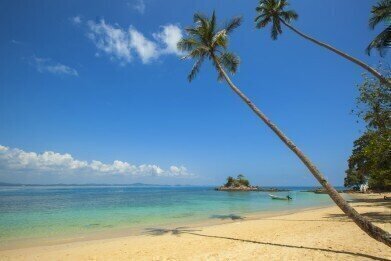Business News
Could These Small Tropical Islands Become the World’s First 100% Renewable Nations?
Aug 05 2016
Several small island states across the Caribbean could become among the first in the world to transition to gleaning 100% of their energy from renewable means.
Climate change has become something of a buzzword among more developed nations, and though concrete targets for renewables and other methods of pollution reduction were set at the COP21 talks in Paris last year, real, tangible improvements have been fairly thin on the ground.
With this relative inactivity from the richer, developed world, there is a gap into which small, tropical islands are perfectly poised to step, taking advantage of their unique circumstances to become the greenest nations on Earth.
Much to gain, nothing to lose
While 197 nations around the world agreed that the time for change is now in April this year, only 15 of them ratified the signed agreement the very same day. 12 of those were tropical island states, including Fiji, Samoa and Barbados.
Perhaps this is largely down to the fact these nations have the most to lose in the face of heightened global temperatures. Should the polar ice caps melt and sea levels rise significantly, the lower-lying islands face the threat of becoming entirely submerged underwater.
Simultaneously, many of these islands rely on low-speed diesel engines to deliver the majority of their electricity. These have the advantage of providing stable supplies of power to the populace, but often come at extortionate prices, meaning that a transition to clean forms of energy would be ideal in terms of an economic outlook.
What’s more, the petrol used to power island vehicles must be shipped in from other nations at a high cost. As a result, they are more incentivised to pursue electric vehicles (EVs) and hybrid machines than those countries with more ease of access to fuel supplies.
Perfectly poised to thrive
Without the reliance on cumbersome oil, coal and gas plants and hydroelectric power stations which many developed nations suffer, the island states are more freely place to switch over their grid to a renewable one. If many islands are currently surviving in the fossil fuel era, they’d surely thrive in the renewable energy economy.
Since the majority of these islands enjoy year-round sunshine and enviable wind patterns, setting up solar and wind power farms makes prudent financial and environmental sense. The energy generated at these farms could then be used to power vehicles as well, in theory weening island states away from fossil fuels completely. At present, EVs only account for around 4% of all new car sales in a small island like Barbados. While that figure might seem small, it’s far greater than in developed nations like the US and the industry is ripe for improvement.
With careful planning, significant investment and a concerted effort to transition to clean, renewable energy forms, there is no reason why Barbados, Fiji or any of the other island nations can’t lead the way in making a greener tomorrow for us all.
Digital Edition
AET 28.2 April/May 2024
May 2024
Business News - Teledyne Marine expands with the acquisition of Valeport - Signal partners with gas analysis experts in Korea Air Monitoring - Continuous Fine Particulate Emission Monitor...
View all digital editions
Events
Jul 30 2024 Jakarta, Indonesia
China Energy Summit & Exhibition
Jul 31 2024 Beijing, China
2024 Beijing International Coal & Mining Exhibition
Aug 07 2024 Beijing, China
IWA World Water Congress & Exhibition
Aug 11 2024 Toronto, Canada
Aug 25 2024 Stockholm, Sweden and online










.jpg)








